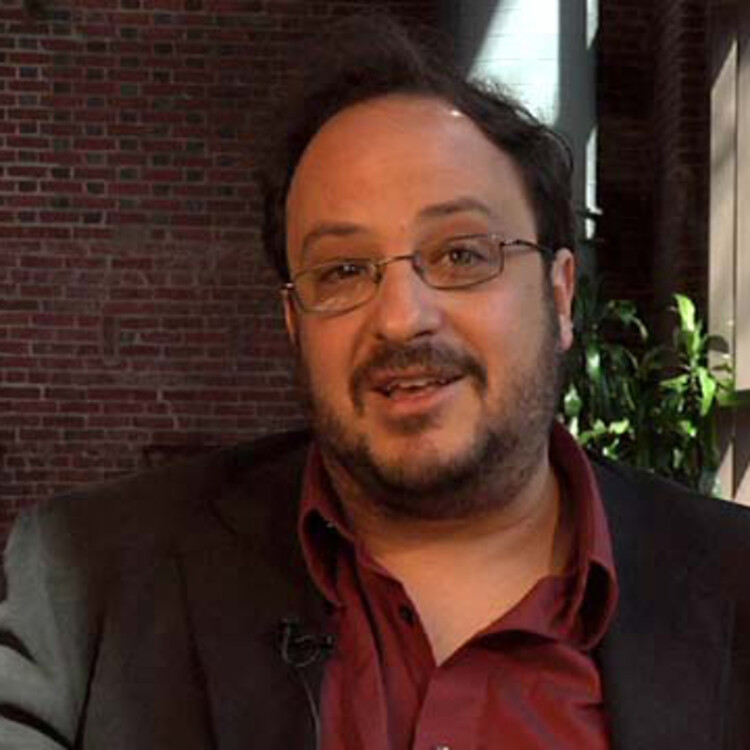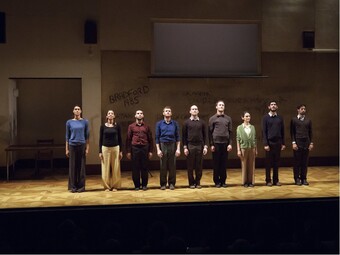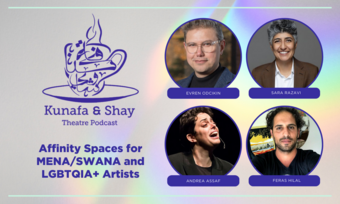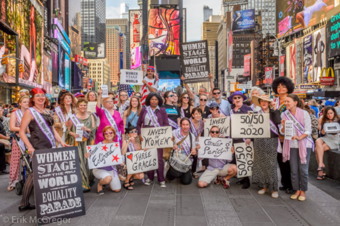Getting Intimate with the Global
Derek Goldman's welcome remarks for Georgetown University’s International Convening on Global Performance, Civic Imagination, and Cultural Diplomacy delivered Thursday, June 14, 2012.
When a few months ago Cynthia Schneider and I received the Reflective Engagement in the Public Interest grant to host this convening, we never imagined the response we would get from such a distinguished group of artists, scholars, policymakers, activists, educators, community leaders, and journalists. We are humbled and honored to welcome you here to Georgetown.
As we were making final preparations, we got a call from Georgetown’s President’s office, telling us that logistics might become complicated today because Secretary of State Hillary Clinton was due to be on-campus speaking this morning.
This felt oddly auspicious, as I was reminded of her visit to campus two and-a-half years ago. It was December 14, 2009, and we had entered exam week here at Georgetown. I was scheduled to meet that morning with Miranda Rose Hall, an undergraduate Theater and Performance Studies major who is an award-winning playwright as well as a gifted performer, director, activist, journalist and poet (She is currently working with the Jesuit Volunteer Corps in Alaska). The night before our meeting, we had received a campus e-mail blast from the President’s Office that Secretary Clinton would be speaking that morning on campus to roll out President Obama’s Human Rights Agenda for the 21st Century. (These last-minute appearances of world leaders are a frequent and welcome occupational hazard at Georgetown).
At virtually the same moment, Miranda and I e-mailed each other, and we ended up agreeing to combine our session with walking over to see the speech together in Georgetown’s stately Gaston Hall. We waited in a long line, and talked about her senior thesis project. We finally settled in the middle of a packed house of about 750 people, and when Secretary Clinton concluded, she had time for three questions. Dozens of hands went up each time, including Miranda’s, and on the third and final question, School of Foreign Service Dean Carol Lancaster, who was moderating the discussion, spotted Miranda’s red jacket among the crowd, called on her, and she stood and with great poise addressed Secretary Clinton:
“I am wondering what you see the role of artists doing in helping to promote human rights. I had the privilege earlier this summer to hear the playwright Lynn Nottage speak in one of the Senate buildings after she advocated for women’s rights in the Congo, and I wonder how you see creative practice accompanying and amplifying policy.”
And, as she heard and received the question, the first mention of the arts and artists in the seventy-five minutes we had been gathered, Secretary Clinton’s whole body seemed to change quite conspicuously. Whereas the rest of her presentation had seemed polished and forceful, slick and certain, here the rhythm of her breath shifted, and she spoke quietly and slowly in a lower register, as if a window had been opened and the air quality in the room was being allowed to adjust. She began:
“That is a wonderful question because I think the arts and artists are one of our most effective tools in reaching beyond and through repressive regimes, in giving hope to people."
She went on:
“Artists can bring to light in a gripping, dramatic way some of the challenges we face. You mentioned the play about women in the Congo. I remember some years ago seeing a play about women in Bosnia during the conflict there. It was so gripping. I still see the faces of those women who were pulled from their homes, separated from their husbands, often raped and left just as garbage on the side of the road. So I think that artists both individually and through their works can illustrate better than any speech I can give or any government policy we can promulgate that the spirit that lives within each of us, the right to think and dream and expand our boundaries, is not confined, no matter how hard they try, by any regime anywhere in the world. There is no way that you can deprive people from feeling those stirrings inside their soul. And artists can give voice to that. They can give shape and movement to it. And it is so important in places where people feel forgotten and marginalized and depressed and hopeless to have that glimmer that there is a better future, that there is a better way that they just have to hold onto.
So I’m going to do what I can to continue to increase and enhance our artistic outreach, but this is also a great area for private foundations, for NGOs, for artists themselves, for universities like Georgetown to be engaged in…. And I think that the power of the arts… is so enormous, and we can’t ever forget about the role that it must play in giving life to the aspirations of people around the world.”
And she ended there, with an eloquent, impassioned statement about the role of the arts which she had not planned to make, but which the serendipitous question from one poised undergraduate drew from her.
Within a day of the speech I had received several e-mails from fellow artists and organizational listservs quoting Hillary’s remarks. Roberta Levitow, now a dear friend and colleague who has been instrumental in helping us shape this convening, but who at the time I didn’t know well personally, sent a large group e-mail to an international group of artists quoting her comments on the arts (without specific foreknowledge of the Georgetown context). Innumerable responses came, such as this one from John O’Neal, influential theater activist and Artistic Dtcg stage mattersirector of Junebug Productions. “Roberta, your note raises my sense of optimism about how we might be able to find support in the future. Best wishes to you and all of us as we struggle to make things better for the world.”
In the ensuing weeks, I would see Hillary’s unscripted and unrehearsed words about the arts would be quoted at length on numerous major websites, and the video of this sequence was even included in TCG’s video Stage Matters, broadcasted at the Los Angeles 2011 TCG Conference.
As I was talking with Professor Waleed Shamil, in residence with us from Baghdad University, he looked at me and tapped his heart and said, “Only through this work together do we have a window into the other’s soul.”
To this day, I am still amazed at how much I see it cited, as perhaps the single most sustained, accessible, articulate, and forceful statement made about the impact of the arts in relation to foreign policy by a high-ranking U.S. Official.
This single serendipitous moment strikes me as a microcosm of the growing sense of possibility and momentum that has led us to this convening. On that December morning, I did nothing special to engender that exchange except to show up with a bright student and bear witness to a conversation. And we come to this convening not to wield expertise, but with a profound sense that the worlds of theater and of foreign policy have a great deal to say to each other in this particular moment, in this particular space, and with gratitude that you are here for the conversation.
Before I came to Georgetown seven years ago, I had, like many of my peers in the American Theater, dabbled a bit in international work. But as a practicing artist and Founding Artistic Director of a professional theater company in Chicago, most of my focus had been closer to home, directing regionally, developing new work and doing community-based projects in schools, prisons, and housing projects. Initially international work seemed too remote and unwieldy to make central—there was simply too much to do right in our own community. And it was hard to wrap one’s head around how to begin. I don’t have language skills, the funding is difficult, and the logistics are daunting.
So many of you in this room have engaged in this work for far longer and in deeper ways than I, and we have much to learn from you. But my own sensibilities as a practicing artist, an educator and a citizen have been profoundly transformed by the cross-cultural exchanges I have been part of, whether travelling with the Center for International Theatre Development to be a part of world-class theater work in Bulgaria, or bringing a delegation of Georgetown students to perform at the UNESCO World Festival of Theatre Schools in Peru, or hosting groups like Belarus Free Theater, Dah Teatar from Belgrade, Ping Chong’s Voices from the Congo, and, of course, the delegation we are currently hosting from Baghdad University.
As a delegate to the ITI World Congress in China, I met colleagues from India, the Sudan, Israel, Poland, Cuba, and Burkina Faso and found that the bonds we shared as theater people were far deeper than the cultural differences between us. In fact these cultural differences seemed somehow to fuel our openness with each other and enable intimacy and trust in a way that I have found is often harder to forge among American colleagues.
I see the world in a radically different way because of these experiences, whether I am reading about global affairs in the newspaper, or going into a rehearsal or classroom. The world feels bigger, and more knowable, more humane. And I feel smaller in it, in a good way.
In these various intimate spaces of exchange, I have felt so palpably the power of the contact zone, the newness of relationships that can and will be lasting and will lead to collaborations, partnerships, new cultural understandings—the sense that something important is happening.
I have come to see the relationship between working locally and globally not as a paradox or tension but as a mutually enforcing continuum. The local, immediate, intimately embodied nature of theater is the very thing that gives it singular potency in the context of doing global work. As I was talking with Professor Waleed Shamil, in residence with us from Baghdad University, he looked at me and tapped his heart and said, “Only through this work together do we have a window into the other’s soul.”













Comments
The article is just the start of the conversation—we want to know what you think about this subject, too! HowlRound is a space for knowledge-sharing, and we welcome spirited, thoughtful, and on-topic dialogue. Find our full comments policy here